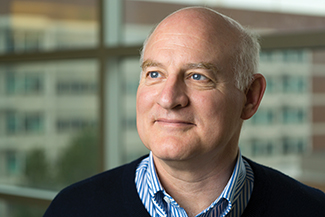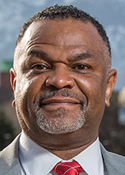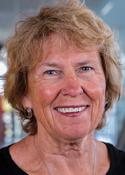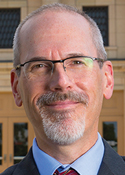Biochemistry Scholar Receives U's Highest Honor
 Wesley I. Sundquist, distinguished professor of biochemistry, has been honored with the 2017 Rosenblatt Prize for Excellence, the University of Utah's most prestigious faculty award. The $40,000 gift is presented annually to a faculty member who displays excellence in teaching, research, and administrative efforts.
Wesley I. Sundquist, distinguished professor of biochemistry, has been honored with the 2017 Rosenblatt Prize for Excellence, the University of Utah's most prestigious faculty award. The $40,000 gift is presented annually to a faculty member who displays excellence in teaching, research, and administrative efforts.
Sundquist has a doctorate in chemistry from Massachusetts Institute of Technology, was a postdoctoral fellow at the MRC Laboratory of Molecular Biology in Cambridge, England, and began his career at the U in 1992 as an assistant professor in the Department of Biochemistry. He became the Samuels Presidential Chaired Professor in 2015 and a distinguished professor in 2017.
Chair emeritus of the School of Medicine Executive Committee and former chair of the Benning Society, Sundquist has also served as co-chair for the Department of Biochemistry with Chris Hill since 2009. Under their leadership, the department has increased in size by 50 percent, and it consistently ranks in the top 20 biochemistry departments in total National Institutes of Health funding.
Sundquist is internationally recognized for his research discoveries in Human Immunodeficiency Virus replication and fundamental processes in cell biology. His work has dramatically enhanced the understanding of the architecture, assembly, and budding of HIV, and his research on viral structures is leading to new strategies for HIV therapeutics that have transformative potential for human health. He is the director of a $24 million award that involves 18 principal investigators from nine institutions across the country.
During his 25 years at the U, Sundquist and his colleagues have published more than 100 scientific journal articles, 16 of which appeared in the prestigious journals Cell, Nature, and Science. He is one of the most cited researchers in the field of HIV/AIDS. As a mentor, Sundquist has trained more than 40 graduate students and postdocs, many of whom currently hold positions in academic and private-sector institutions.
Clear Bag Policy Coming in 2018
 A clear bag policy will be phased in at all athletics events at Rice-Eccles Stadium and the Huntsman Center this coming fall with the goal of speeding up security checkpoints and protecting fans. Enforcement of the clear bag policy will not go into effect until July 1, 2018, although fans are encouraged to begin complying with the new policy immediately.
A clear bag policy will be phased in at all athletics events at Rice-Eccles Stadium and the Huntsman Center this coming fall with the goal of speeding up security checkpoints and protecting fans. Enforcement of the clear bag policy will not go into effect until July 1, 2018, although fans are encouraged to begin complying with the new policy immediately.
The policy change comes on the heels of several recent security breaches involving venues for large events around the globe. “This proactive measure will enhance security inside and outside of the athletic venues and speed up the security screening process for all fans,” says U Police Chief Dale Brophy. “Security staff will be checking bags, which means shorter lines, fewer hassles, more time in the venue enjoying your favorite sport(s), and a greater sense of security.”
The policy allows for a variety of options for fans. Each guest may carry one clear bag no larger than 12 inches by 6 inches by 12 inches, or a one-gallon plastic freezer bag. Small clutches or purses for privacy are still allowed under the policy. Diaper bags may also be taken into venues with the accompanying child/infant. Seat cushions without pockets or compartments will continue to be allowed as well.
Clear bag policies are a growing trend among many colleges and national sports venues. The NFL made the switch in 2013. Institutions in the Southeastern Conference, along with the U’s fellow Pac-12 member Arizona State, have also been early adopters.
Utes Had Record Year for NFL and NBA Drafts

The U's eight 2017 NFL Draft picks led the Pac-12 and tied for fourth in the country, while in the NBA Draft, Utah became the only school from the Pac-12 to have at least one player selected in the draft the past three seasons.
In the NFL Draft, offensive tackle Garett Bolles became the eighth first-round draft pick in Utah history when he was selected by the Denver Broncos as the No. 20 overall pick. Utah safety Marcus Williams was selected by the New Orleans Saints as the 10th pick of the second round. Running back Joe Williams BS’16, offensive guard Isaac Asiata BS’16, cornerback Brian Allen BS’16, center J.J. Dielman BS’16, offensive tackle Sam Tevi BS’16 and outside linebacker Pita Taumoepenu went in rounds 4-7. The 2017 Ute draft class broke the former school mark of six picks in 2010.
In the NBA Draft, men's basketball forward Kyle Kuzma became the 44th player in school history to be taken after he was selected as the 27th overall pick in the first round by the Brooklyn Nets and then traded to the Los Angeles Lakers. Kuzma is the 12th Utah player to be selected in the first round of the NBA Draft, and his selection marks the seventh time in school history since 1958 that Utah has had a player selected in three consecutive seasons.
Athletics Adds Women's Beach Volleyball and Men's Lacrosse

(Photo left courtesy U Athletics; photo right by Tim Haslam)
On the heels of adding women’s beach volleyball in spring 2017 as a new intercollegiate sport, the U Athletics Department announced this summer that it will also be sponsoring men’s lacrosse as an NCAA sport starting in 2018-19. Utah is the ninth Pac-12 member institution to sponsor beach volleyball. Men’s lacrosse is the U’s first completely new NCAA sport since women’s soccer was added back in 1995. With the addition of both of these new sports, Utah will support 20 total NCAA sports—eight men’s and 12 women’s.
Utah's beach volleyball operates as a combined program, drawing its members and coaches from the existing volleyball program, including coaches Beth Launiere, director of volleyball, and JJ Van Niel, head beach volleyball coach. The team completed its inaugural season in 2017, going 2-12 overall with the season highlight defeating Oregon at the Pac-12 Championship. At the finish of the Pac-12 season, freshman Dani Barton received Second Team All-Pac-12 accolades and was named to the Pac-12 All-Freshman team. The players practice in the new beach volleyball gym in the Einar Nielsen Fieldhouse on campus.
Men’s lacrosse will continue to compete as a club sport this year while it makes the transition into NCAA status. The program was endowed through a $15.6 million gift funded by an anonymous lead donor and other benefactors. No state or university funds will be used to support the program. Brian Holman, club lacrosse head coach, will lead the new team. A former eight-year assistant coach at the University of North Carolina at Chapel Hill, Holman helped lead UNC to the 2016 NCAA Championship before accepting the head club coaching position at Utah.
With 70 men's lacrosse programs in NCAA Division I, Utah becomes the first Pac-12 school with an NCAA men's lacrosse team and will join Denver and Air Force as the only Division I men's lacrosse programs west of the Mississippi. U Athletics plans to pursue a conference affiliation for its newest sport. The team will play its games at Ute Soccer Field and will hold practices on the infield of the McCarthey Family Track & Field Complex. The lacrosse season, which typically consists of around 15 contests, begins in February and runs through May. Season tickets will go on sale in the spring of 2018.
U Appoints Three New Deans
 Martell Teasley, new dean of the College of Social Work, comes to the U from the University of Texas at San Antonio, where he served as chair of the Department of Social Work in the College of Public Policy for the past five years. His experience also includes the development of a disaster management certificate program at Florida State University, employment as a drug and alcohol counselor, time as a licensed practical nurse, and a decade of service with the U.S. Army.
Martell Teasley, new dean of the College of Social Work, comes to the U from the University of Texas at San Antonio, where he served as chair of the Department of Social Work in the College of Public Policy for the past five years. His experience also includes the development of a disaster management certificate program at Florida State University, employment as a drug and alcohol counselor, time as a licensed practical nurse, and a decade of service with the U.S. Army.
Teasley emphasizes the importance of classroom instruction and program fidelity, noting, “students should know that the administration, faculty, and staff will work hard to make sure that our students are among the best educated in the country.” During his tenure, Teasley says the College of Social Work will continue to advance its commitment to community outreach, advocacy, and helping local communities address social service needs. Teasley received his doctorate in social work from Howard University, and his bachelor’s and master’s degrees from Fayetteville State University and Virginia Commonwealth University, respectively.
 Elaine Clark, professor of educational psychology, is the new dean of the College of Education. “I am honored to have this unique opportunity to work with the outstanding faculty and staff in the college,” says Clark. “The College of Education is a significant contributor to ensuring that all children with varied backgrounds, needs, and abilities have access to a high-quality education, including one that provides effective academic, social, emotional, and mental health supports.”
Elaine Clark, professor of educational psychology, is the new dean of the College of Education. “I am honored to have this unique opportunity to work with the outstanding faculty and staff in the college,” says Clark. “The College of Education is a significant contributor to ensuring that all children with varied backgrounds, needs, and abilities have access to a high-quality education, including one that provides effective academic, social, emotional, and mental health supports.”
A faculty member in the U’s Department of Educational Psychology since 1983, Clark served as the director of the school psychology program for 21 years and department chair for six. She has dedicated her career to the development of applied research and the preparation of school psychologists to provide effective services to individuals who have significant social, emotional, and learning challenges, in particular, those with an autism spectrum disorder. Clark received her bachelor’s, master’s, and doctorate in educational psychology from Michigan State University as well as a doctorate in neuropsychology from Brigham Young University.
 John Scheib joins the U as dean of the College of Fine Arts from the University of Kentucky, where he was director of the School of Music for the past three years. He is recognized for his talent as a keen listener who works with his team, including community members, to build and enact vision and strategy to advance the arts.
John Scheib joins the U as dean of the College of Fine Arts from the University of Kentucky, where he was director of the School of Music for the past three years. He is recognized for his talent as a keen listener who works with his team, including community members, to build and enact vision and strategy to advance the arts.
His research in music education is rooted in his experience as a music teacher in the Wisconsin public schools for nine years. He focuses on, among other things, the beliefs and practices of music teachers and their students, and music education reform. “I am excited to be joining a college and university with such a strong commitment to the development of creative and innovative leaders and citizens,” says Scheib. “Our roles as artists, arts scholars, and arts educators are vital as we provide key opportunities for students to develop the wide range of intelligences and skills necessary for 21st-century success.” Scheib received his master’s and doctorate from the University of Wisconsin-Madison in music education.
Campus to Become 100% Tobacco-Free
 A new student-led initiative will make the U a completely tobacco-free campus beginning in July 2018. The proposition was first brought to the U’s attention in 2010 by students in ASUU and underwent several years of discussion. Then in 2016, the charge was taken up again by a dedicated group of students with the help of a committee including faculty and staff, and the policy made its way through the Academic Senate.
A new student-led initiative will make the U a completely tobacco-free campus beginning in July 2018. The proposition was first brought to the U’s attention in 2010 by students in ASUU and underwent several years of discussion. Then in 2016, the charge was taken up again by a dedicated group of students with the help of a committee including faculty and staff, and the policy made its way through the Academic Senate.
The goal is to support the health and well-being of all who work, seek care, visit, and learn at the university. The policy will apply to owned and leased campus premises and U vehicles and is applicable 24 hours a day, seven days a week. Prohibited tobacco products are defined as cigarettes, cigars, pipes, water pipes (hookah), bidis, kreteks, smokeless tobacco, chewing tobacco, snus, snuff, electronic cigarettes, and any other nicotine-delivery products.
“Our No. 1 priority is to be inclusive to our diverse community during the transition to becoming a tobacco-free campus,” says Chief Wellness Officer Robin Marcus BS’83 MS’88 PhD’01. “Over the coming year, we encourage you all to support each other in a positive, nonconfrontational manner as we make this transition.”
As of April 3, 2017, there are now more than 1,800 smoke-free campus sites across the country. Of these, 1,536 are 100 percent tobacco free, and 1,400 also prohibit e-cigarette use. To assist faculty, staff, and students through the transition, the university will offer smoking cessation programs.
New Center Opens for Mindfulness and Integrative Health

The University of Utah College of Social Work Assistant Dean Dr. Eric Garland in his lab with a graduate student.
The U has launched a new center dedicated to providing a transformative influence on health care by unifying research on mindfulness and other integrative behavioral health interventions. Eric Garland, associate dean for research at the College of Social Work, serves as director of the new Center on Mindfulness and Integrative Health Intervention Development (C-MIIND). The center, which assumes oversight of more than $17 million in federal research grants, is housed in the college.
“The center will advance a vision of a new model of health care, in which behavioral health experts work in tandem with medical providers to address the physical, psychological, and social needs of people suffering from an array of health conditions,” says Garland, whose research focuses on using mindfulness to help individuals who experience chronic pain.
The center will bring together researchers and clinicians from across main campus and U of U Health( including faculty in social work, psychiatry, primary care, anesthesiology, neuroscience, psychology, and health) who are pioneering integrative interventions aimed at improving physical and mental well-being. C-MIIND will strive to attract top faculty and provide research opportunities for undergraduate, graduate, and postdoctoral fellows interested in studying mindfulness and integrative behavioral health.
A focus of the center also will be to train post-graduates and health care providers in innovative therapies to be used in primary care clinics, hospitals, community mental health centers, and addiction treatment facilities.
Business School Gets $20 Million Gift for New Economics Institute
The U’s David Eccles School of Business is establishing the Marriner S. Eccles Institute for Economics and Quantitative Analysis with the support of a $10 million gift from the George S. and Dolores Doré Eccles Foundation and the Marriner S. Eccles Foundation. The Charles Koch Foundation matched the $10 million for a combined gift of $20 million.
“We are proud to partner with these foundations to create a world-class economics institute at the David Eccles School of Business,” says President David Pershing. “It will enhance and complement the university’s existing program in economics, expanding areas of faculty expertise and interdisciplinary opportunities and, most importantly, engaging our students in a balance of practical and theoretical learning opportunities.”
The mission of the institute is to push the frontiers of knowledge through academic research and provide U students access to high-quality education in areas such as game theory, econometrics, and quantitative analysis. Its generous funding will enable the university not only to recruit seven leading economists as academic faculty, but also to support innovative research and provide $1.6 million in student scholarships. Its focus will include the development of students’ quantitative skills, which are widely seen as critical for success in today’s data-driven job market. In doing so, it promises to open career opportunities for Utah students in an everexpanding array of areas from banking and private equity to technology and academia.
“The impact of this gift cannot be overstated,” says Taylor Randall HBA’90, dean of the David Eccles School of Business. “This institute will take the school and the university to another level of distinction, bringing leading economists into the Eccles School’s ranks who will enhance student learning in areas including economic thought and quantitative analysis, unlocking opportunities for them in a wide range of careers.”